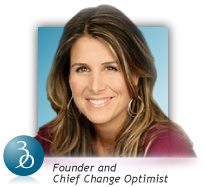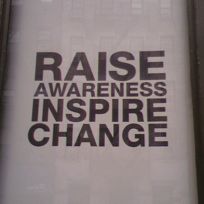Ariane’s Blog
A place to explore, embrace & make change happen
The 24-Hour No Blame Challenge
I recently joined WebTalk Radio host Paul McLoughlin for a wide-ranging interview addressing the anxieties currently gripping the nation and how to navigate a host of changes.
Adapting to change is the number one life skill we can cultivate right now. During the interview, Paul asked "What gives you the right to talk about other people's change?" Good question. My passion over the past five years has been to meet and interview thousands who have undergone change--they've lost their money, started businesses, divorced, lost a loved one and suffered the gamut of life issues. All these people have had to find a way of getting through tough and some great changes. I've seen the patterns and principles of change that truly make a difference in a time of crisis. I've gone through my own share of changes-leaving jobs, starting a business, losing loved ones, breaking off an engagement and losing most of my savings a few years ago. Take a moment to listen to the interview. We covered changes in the markets, education, health and our jobs. I can't think of any area Paul didn't ask me about.
Bringing it back to a macro level, a lesson I've learned is that companies don't change--people change. Countries don't change, people will have to change. It will be the individuals that precipitate change.
I recently read that when we are faced with times of crisis, our primary emotional patterns will come out even more strongly during the upheaval. So, angry people will become angrier, people who blame will blame even more, people who are full of fear will become more fearful. And people who are grateful will become more grateful, people who are focused on helping will find more ways to help. So, what is your primary go-to emotion these days? You are most likely doing more of it.
Here's a suggestion, since there's so much blame energy going on right now in the country and I really do believe change starts with each one of us. Tomorrow, for just 24 hours, don't blame the President, the government, your boss, your broker, yourself, the cab driver, your partner or anyone else for what's going on. Notice how much time and energy in your day is consumed with being focused on blame. Regardless of whether you're justified or not, blame never achieves anything. We really need people to contribute more hope than fear right now.











I had got a dream to begin my organization, nevertheless I did not earn enough amount of money to do it. Thank God my colleague recommended to take the personal loans. Thus I took the financial loan and made real my desire.
Ariane
I think it is great that you are putting a 'no-blame' idea on your website. I work in mediation, supporting conflict resolution and the use of blame is the main obstruction to resolution of many disputes. In a blame environment many people spend their time preoccupied with either allocating blame or avoiding it as the condemnation that comes with it is so great. This leads to a lack of focus on ways forward. Many top business people advocate learning from mistakes. That is only possible in a no-blame environment, an environment in which it is acknowledged that we all make mistakes and expecting each other to be 'perfect' and without fallibility is a highly ineffective means of operating an organisation or other 'system'. I have a webpage on 'no-blame' and many of the principles that underpin mediation practice implicitly support a no-blame approach. Those who think it means losing accountability have misunderstood the concept. If I may, my website is at Link and there are various related pages on a no-blame approach and similar ideas.
Alan Sharland